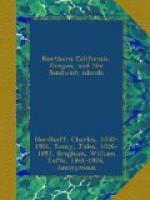There are about eighty scholars on the school-list, and about fifty attend school. Was there any compulsion used? I asked, and he said No. Now surely here, if anywhere, one might begin with a compulsory school-law.
Did he attempt to regulate the conduct of the growing boys and girls? No.
Do the Indians marry on the reservation? No. One chief has two wives; men leave their wives, or change them as they please.
What if children are born irregularly? Well, the reservation feeds and supports all who are on it. Nobody suffers.
Are the women often diseased? Yes, nearly all of them.
Have you a hospital, or do you attempt to isolate those who are diseased? No; the families all take care of their sick. The doctor visits them in their shanties. (Bear in mind this reservation was established, and has had Indians on it since 1860.)
Do the Indians have to ask permission to go to the town? No; they go when they please.
Is there much drunkenness? No; singularly little.
Do you attempt to make them rise at any specified hour in the morning? No.
Have you a list or roster of the Indians who belong
on the reservation?
No.
How many Indians own horses? I do not know.
On Sunday there is preaching; the audience varies; and those who do not come to church—where the preaching is in English—play shinny.
Is not all this deplorable? Here is a company of ignorant and semi-barbarous people, forcibly gathered together by the United States Government (with the help of a mob), under the pretense that they are the “unfortunate wards of the nation;” and the Government does not require the officers it sets over them to control them in any single direction where a conscientious guardian would feel bound to control his ward. How can habits of decency, energy, order, thrift, virtue, grow up—nay, how can they continue, if in the beginning they existed, with such management? Captain Jack and his forty-five Modocs were at least brave and energetic men. Can any one blame them, if they were bored to desperation by such a life as this, and preferred death to remaining on the reservation?
Nor is this all. Of the two thousand acres of arable land on the reservation, about five hundred are kept for grazing, and one thousand acres are in actual cultivation this year—seven hundred in grain and hay, one hundred and ninety-five in corn, and one hundred and nine in vegetables. A farmer, assistant-farmer, and gardener manage this considerable piece of land. When they need laborers they detail such men or women as they require, and these go out to work. They seldom refuse; if they do, they are sent to the military post, where they are made to saw wood. Not one of the cabins has about it a garden spot; all cultivation is in common; and thus the Indian is deprived of the main incentive to industry and thrift—the possession of the actual fruits of his own toil; and, unless he were a deep-thinking philosopher, who had studied out for himself the problems of socialism, he must, in the nature of things, be made a confirmed pauper and shirk by such a system, in which he sees no direct reward for his toil, and neither receives wages nor consciously eats that which his own hands have planted.




